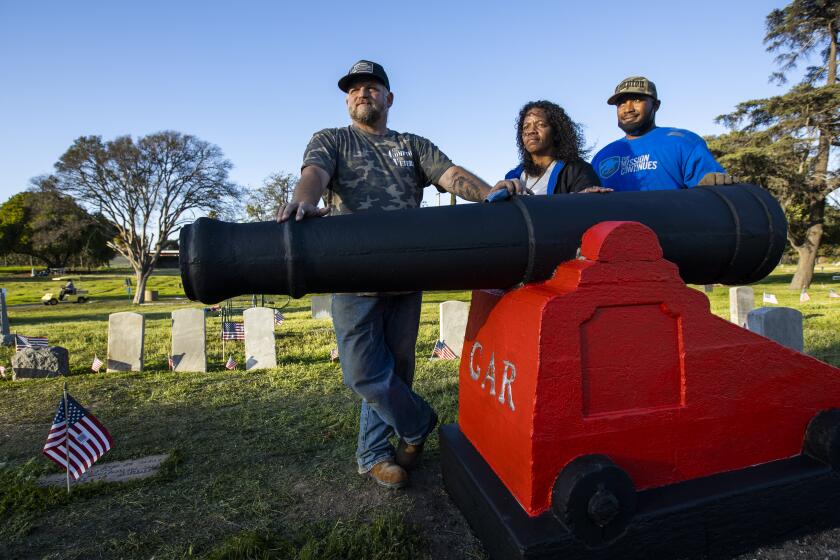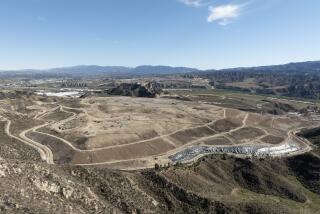With the fate of their sacred space in limbo, they took over the cemetery
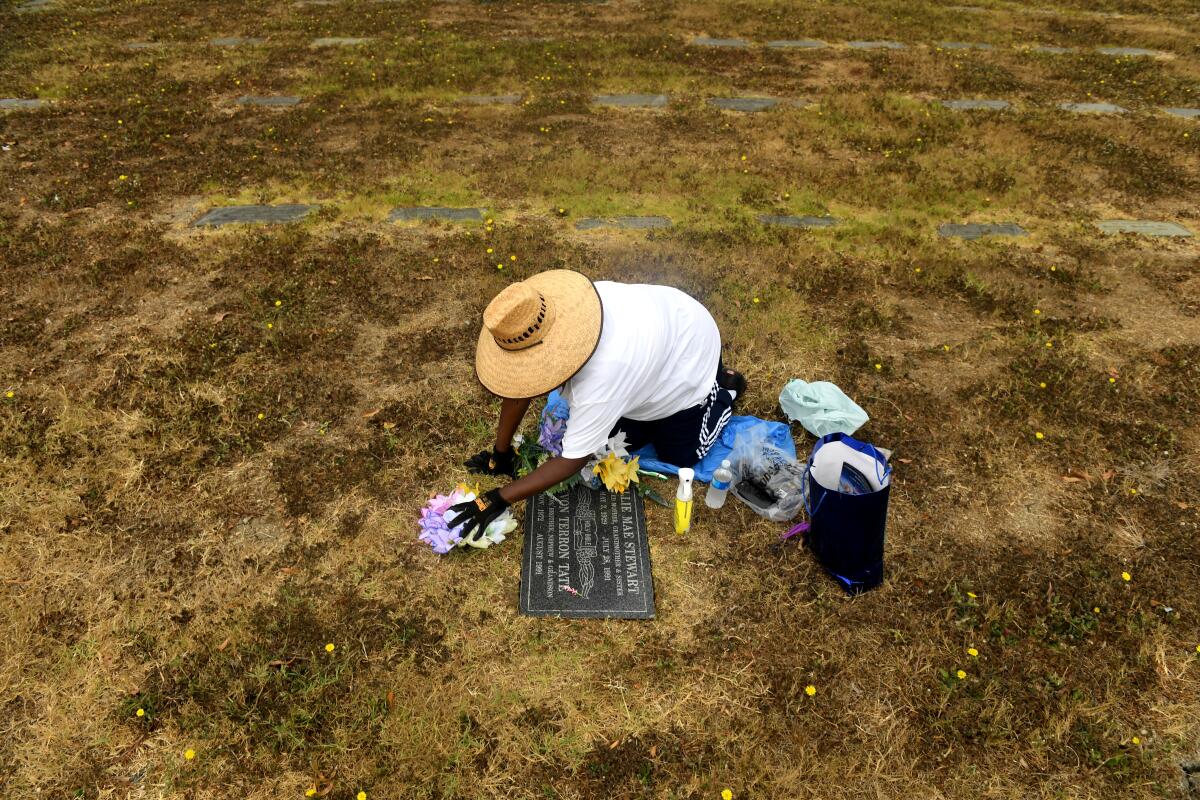
- Share via
The cemetery was arid, weedy and chained shut, with a sign that simply said, “Unreachable.”
Somehow, they had to get inside.
The three women standing at the wrought-iron gate on that day in late July had never met before. But they found they had a couple of key things in common: a sense of incredulity that Lincoln Memorial Park Cemetery was closed and the determination to get past those gates to where their loved ones were buried.
As Aisha Woods put it, “Fate sometimes brings people together.”
This 20-acre park in Carson may not look like much now, but it’s historic. It holds plots that date back to the early 1930s, with some of the deceased having been born during and just after the Civil War. Near the entrance, a bronze bust of Abraham Lincoln commemorates the founding of the desegregated cemetery in the late ’20s.
Famed boxer Joe Lewis dedicated a plaque there in 1949. A more recent tribute, in 2000, was for Carson’s James Anderson Jr., who was posthumously awarded the Medal of Honor for service during the Vietnam War, where in 1967 he jumped on a grenade to save his platoon.
More important to these visitors and dozens of others is that the cemetery is where their loved ones were laid to rest. Woods has four generations and at least a dozen family members buried there. “I don’t know what needs to be done to save Lincoln,” she said, but on that day, “I knew we had a team.”
The trio of women sought answers from city officials but got no explanation, they said. They just knew that Lincoln’s owner wasn’t around, park staff had stopped tending the grounds weeks before the gates were locked, and their calls to the cemetery’s office were going unanswered.
But four days of pressure on social media and calls to city, county and state employees by the trio and Facebook friends produced a result.
On July 26, Woods, Valerie Holyfield, Felicia Jones and some others took possession of the keys to the cemetery. An anonymous person had broken the lock the previous night, and Assemblymember Mike Gipson (D-Carson) gave the trio a new lock and key. The women opened the park, to the delight of dozens of people with family buried there.
They vowed to take turns opening and closing the cemetery, at 9 a.m. and 6 p.m., and solicited help from volunteers. There was just one nagging issue the women couldn’t answer.
“We’ve been trying to find out who’s going to take over this cemetery,” said Holyfield, who noted she had 20 to 30 family members buried at Lincoln.
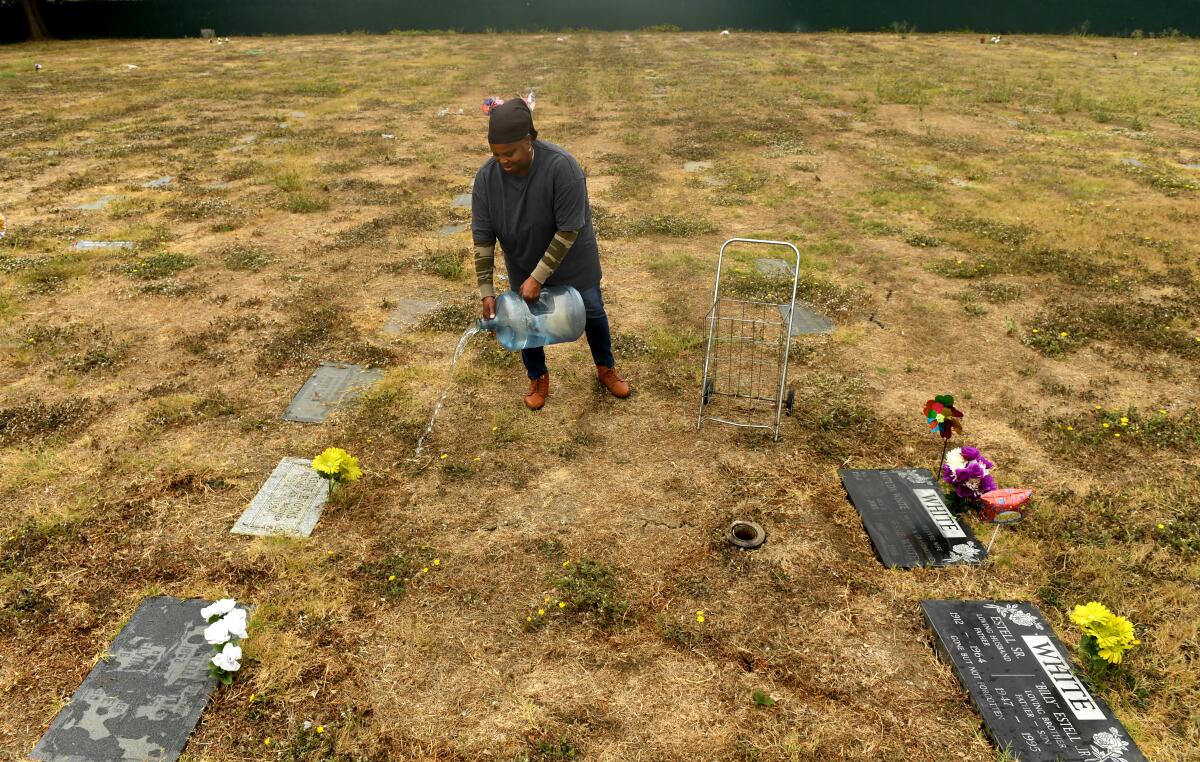
The answer is unclear. What is clear is that the cemetery has had a troubled history.
The park’s owner, John Michael Mintz, earlier this year canceled his operating license, and his cemetery manager’s license expired July 31, as confirmed Aug. 8 by the Cemetery and Funeral Bureau of California.
Gipson said Mintz, 74, “was gravely ill and uncommunicative” and had never fully recovered from a stroke that he suffered years earlier.
Calls to Mintz were not returned. Mintz took over Lincoln Memorial in the mid-’90s when the state seized the 20-acre site from its former owners, Hollywood Cemetery Assn. The cemetery board accused the owners of embezzlement of $400,000 from endowment funds, improper burials and discarded headstones.
Woods referred to Mintz as “a good owner,” but Holyfield said she was disappointed he “didn’t have a plan” for succession.
The state of the park has deteriorated.
Although there are green spots near the entrance, where the Lincoln bust stands, most of the park is arid.
Cracks and fissures in the clay soil have deepened and encircle headstones along with the only thriving vegetation — weeds. A corrugated metal wall that separates the park from Caldwell Street Elementary School teeters on the verge of collapse.
The termination of both of Mintz’s permits means the cemetery is now considered “unlicensed, abandoned and outside of the Bureau’s regulatory authority,” the bureau noted.
The cemetery’s immediate care is in limbo.
The bureau offered no timeline in its release but noted that cities, counties and courts could all potentially intervene.
The state of California could sue for a court order to appoint a temporary manager. Alternatively, the city of Carson or Los Angeles County could appoint a temporary manager, as per Assembly Bill 651, which passed in 2021. A temporary manager can oversee the facility for six months, then a permanent owner would need to be found.
Ending legal action by relatives whose family graves had been mishandled by a Santa Fe Springs cemetery, a court commissioner approved a $3.9-million settlement Thursday with about 40 mortuaries in the Los Angeles area.
Gipson was behind AB 651, which was created to help establish an endowment fund for neighboring Woodlawn Memorial Park in Compton.
In 2020, the park’s owner surrendered his license after a state investigator found the facility in poor shape, and homeless people and wildlife had begun to take up residence on the grounds.
The owner owed more than $800,000 in back taxes, which discouraged others from taking over the property.
Beyond endowment care, Gipson’s bill added the tweak allowing a city or county to step in to appoint a temporary caretaker.
Whoever takes over the cemetery would be responsible for opening and closing the cemetery, maintaining the lawn, cleaning up trash and providing water to visitors.
Gipson said the next step would be “getting the county to provide the services that AB 651 outlines.”
Gipson said a strategy would be discussed at a town hall meeting Friday at Prevailing in Christ Ministries in Carson. The gathering is slated for 6 p.m. and includes state Sen. Steven Bradford (D-Gardena), Carson Mayor Pro Tem Jawane Hilton and a representative from the county, the cemetery bureau and the state Department of Consumer Affairs.
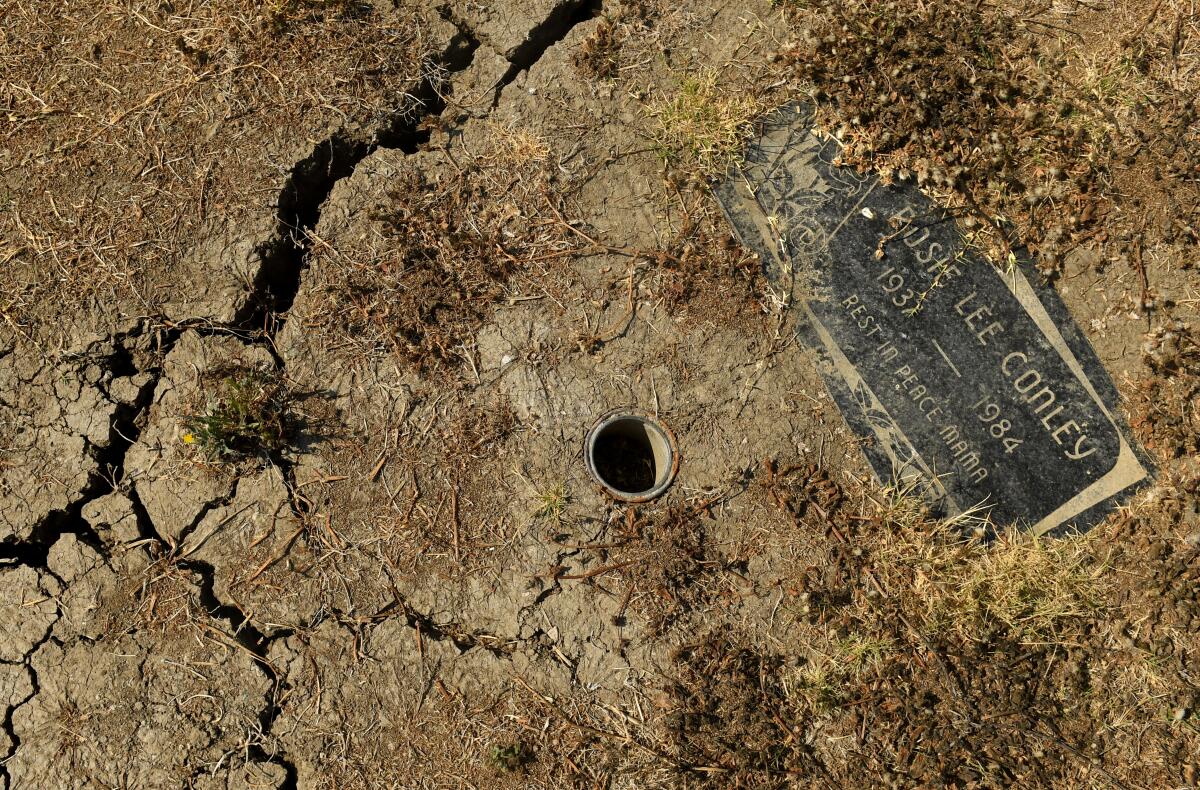
The idea of a county takeover, however, did not sit well with area Supervisor Holly Mitchell.
Mitchell said the county had no department or mechanism to monitor the county’s 120 cemeteries. She said the state already has a funeral bureau and it should handle running Lincoln Memorial Park.
But Mitchell said she was interested in investigating ways the county could put protections in place for when a private business owner chooses to walk away from a cemetery, “which is unconscionable,” she said.
Tanya Marsh, an associate dean at North Carolina’s Wake Forest University who teaches a law school course focusing on funeral and cemetery law, said that cemetery abandonment is more common than some realize.
“Especially in the case of religious organizations, there are tons of abandoned cemeteries in the United States,” she said, “because a church dissolves or a congregation moves and the cemetery stays behind.”
Marsh said a lawsuit by the state might be the quickest way to move forward, with a court order allowing the state to appoint a temporary caretaker.
Celestina Bishop is trying to save the cemetery that is her strongest connection to the family she never knew.
Marsh said, however, that finding a temporary manager could be challenging, particularly if the endowment is low on funds or running the cemetery “is a money-losing proposition.”
“Then you may see the county step in,” she said.
The funeral bureau did not respond to a series of questions sent by The Times, including about how much money was left in the Lincoln Memorial Park Cemetery endowment.
Hilton, who successfully lobbied the local water company to turn on the cemetery’s water Friday, asked visitors for patience.
“Be patient, but know that we know this is a horrible feeling ... and we’re trying to do what we can,” said Hilton, whose great-grandfather is buried at Lincoln.
On Saturday, about 50 volunteers led by Holyfield and Woods spent eight hours cleaning the cemetery.
Push brooms wiped off months of dust and dirt from headstones, while weed wackers and lawn mowers contended with dandelions, thistles and crabgrass.
The women tended to cemetery plots directly across from each other.
Woods polished the headstone of her mother, Margie, who was buried there in October 2017. Holyfield wiped the plaques of her 31-year-old daughter, Jennifer A. Dickerson, and the tomb of her 15-year-old son, Harvey Dickerson. Both were shot to death, 12 years apart, and the cases remain unsolved.
“My fight for this cemetery is my chance to at least get a little justice for my children,” Holyfield said. “I wish those people trying to decide who will take over realize how sacred this place is to us. It’s where our families rest.”
More to Read
Sign up for Essential California
The most important California stories and recommendations in your inbox every morning.
You may occasionally receive promotional content from the Los Angeles Times.
